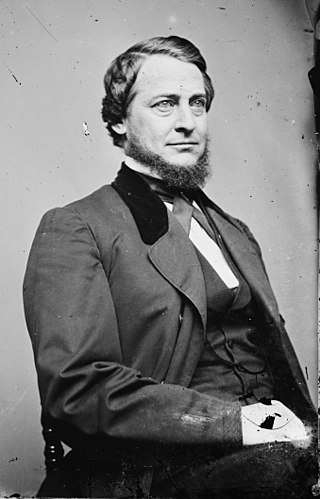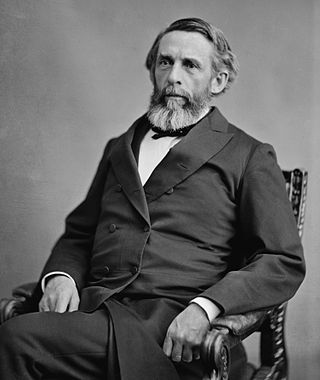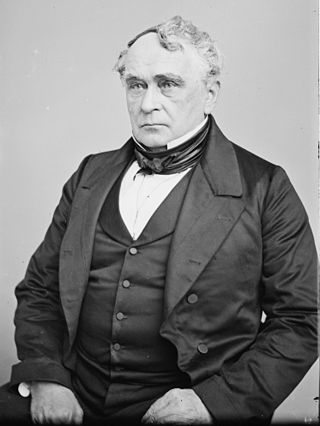Related Research Articles

Henry Wilson was an American politician who was the 18th vice president of the United States from 1873 until his death in 1875 and a senator from Massachusetts from 1855 to 1873. Before and during the American Civil War, he was a leading Republican, and a strong opponent of slavery. Wilson devoted his energies to the destruction of "Slave Power", the faction of slave owners and their political allies which anti-slavery Americans saw as dominating the country.

In the 1860s, the Copperheads, also known as Peace Democrats, were a faction of the Democratic Party in the Union who opposed the American Civil War and wanted an immediate peace settlement with the Confederates.

Clement Laird Vallandigham was an American lawyer and politician who served as the leader of the Copperhead faction of anti-war Democrats during the American Civil War.

John Murray Forbes was an American railroad magnate, merchant, philanthropist and abolitionist. He was president of both the Michigan Central railroad and the Chicago, Burlington and Quincy Railroad in the 1850s. He kept doing business with Russell & Company.

The American Anti-Imperialist League was an organization established on June 15, 1898, to battle the American annexation of the Philippines as an insular area. The anti-imperialists opposed forced expansion, believing that imperialism violated the fundamental principle that just republican government must derive from "consent of the governed." The League argued that such activity would necessitate the abandonment of American ideals of self-government and non-intervention—ideals expressed in the United States Declaration of Independence, George Washington's Farewell Address and Abraham Lincoln's Gettysburg Address. The Anti-Imperialist League was ultimately defeated in the battle of public opinion by a new wave of politicians who successfully advocated the virtues of American territorial expansion in the aftermath of the Spanish–American War and in the first years of the 20th century, although the organization lasted until 1920.

Francis Lieber was a Prussian-American jurist and political philosopher. He is most well known for the Lieber Code, the first codification of the customary law and the laws of war for battlefield conduct, which served a later basis for the Hague Conventions of 1899 and 1907 and for the Geneva Conventions. He was also a pioneer in the fields of law, political science, and sociology in the United States.
John Dunlap was an early American printer who emigrated from Ulster, Ireland and who printed the first copies of the United States Declaration of Independence and was one of the most successful Irish/American printers of his era. He served in the Continental Army under George Washington during the American Revolutionary War.

Charles Anderson Dana was an American journalist, author, and senior government official. He was a top aide to Horace Greeley as the managing editor of the powerful Republican newspaper New-York Tribune until 1862. During the American Civil War, he served as Assistant Secretary of War, playing especially the role of the liaison between the War Department and General Ulysses S. Grant. In 1868 he became the editor and part-owner of The New York Sun. He at first appealed to working class Democrats but after 1890 became a champion of business-oriented conservatism. Dana was an avid art collector of paintings and porcelains and boasted of being in possession of many items not found in several European museums.

Adolphus Washington Greely was a United States Army officer and polar explorer. He attained the rank of major general and was a recipient of the Medal of Honor.

The United States Sanitary Commission (USSC) was a private relief agency created by federal legislation on June 18, 1861, to support sick and wounded soldiers of the United States Army during the American Civil War. It operated across the North, raised an estimated $25 million in Civil War era revenue and in-kind contributions to support the cause, and enlisted thousands of volunteers. The president was Henry Whitney Bellows, and Frederick Law Olmsted acted as executive secretary. It was modeled on the British Sanitary Commission, set up during the Crimean War (1853-1856), and from the British parliamentary report published after the Indian Rebellion of 1857.

Alexander Hamilton Rice was an American politician and businessman from Massachusetts. He served as Mayor of Boston from 1856 to 1857, a U.S. Congressman during the American Civil War, and as the 30th Governor of Massachusetts from 1876–1878. He was part owner and president of Rice-Kendall, one of the nation's largest paper products distributors.

During the American Civil War, the State of Ohio played a key role in providing troops, military officers, and supplies to the Union army. Due to its central location in the Northern United States and burgeoning population, Ohio was both politically and logistically important to the war effort. Despite the state's boasting a number of very powerful Republican politicians, it was divided politically. Portions of Southern Ohio followed the Peace Democrats and openly opposed President Abraham Lincoln's policies. Ohio played an important part in the Underground Railroad prior to the war, and remained a haven for escaped and runaway slaves during the war years.

The Commonwealth of Massachusetts played a significant role in national events prior to and during the American Civil War (1861–1865). Massachusetts dominated the early antislavery movement during the 1830s, motivating activists across the nation. This, in turn, increased sectionalism in the North and South, one of the factors that led to the war. Politicians from Massachusetts, echoing the views of social activists, further increased national tensions. The state was dominated by the Republican Party and was also home to many Radical Republican leaders who promoted harsh treatment of slave owners and, later, the former civilian leaders of the Confederate States of America and the military officers in the Confederate States Army.

New York City during the American Civil War (1861–1865) was a bustling American city that provided a major source of troops, supplies, equipment and financing for the Union Army. Powerful New York politicians and newspaper editors helped shape public opinion toward the war effort and the policies of U.S. President Abraham Lincoln. The port of New York, a major entry point for immigrants, served as recruiting grounds for the Army. Irish-Americans and German-Americans participated in the war at a high rate.

John Quincy Adams II was an American politician who represented Quincy in the Massachusetts House of Representatives from 1866 to 1867, 1868 to 1869, 1871 to 1872, and from 1874 to 1875.

Propaganda for Japanese-American internment is a form of propaganda created between 1941 and 1944 within the United States that focused on the relocation of Japanese Americans from the West Coast to internment camps during World War II. Several types of media were used to reach the American people such as motion pictures and newspaper articles. The significance of this propaganda was to project the relocation of Japanese Americans as matter of national security, although according to a federal commission created by President Jimmy Carter in 1980:
The promulgation of Executive Order 9066 was not justified by military necessity, and the decisions that followed from it – detention, ending detention and ending exclusion – were not driven by analysis of military conditions. The broad historical causes which shaped these decisions were race prejudice, war hysteria and a failure of political leadership.
The Unconditional Union Party was a loosely organized political entity during the American Civil War and the early days of Reconstruction. First established in 1861 in Missouri, where secession talk was strong, the party fully supported the preservation of the Union at all costs. Unlike the similarly named Unionist Party, which operated throughout the North, the Unconditional Unionist Party only operated in the border states. Members included Southern Democrats who were loyal to the Union as well as elements of the old Whig Party and other factions opposed to the separate Southern Confederacy. The party was dissolved in 1866.

James Kendall Hosmer was an American (Union) soldier during the American Civil War, a pastor, library director, historian, author and a professor of history and literature. Members of the Hosmer family fought in the French and Indian War, American Revolution and the Civil War. As a pastor of the First Church in Deerfield, Massachusetts he left the ministry, feeling duty bound to join the U.S. Army to serve in the Civil War, insisting to serve at the front, where he participated in several major campaigns. As an author and historian he later wrote and published several works about and involving the Civil War and how he viewed the cause of both the North and South. He also authored a number of other works relating to early American history, along with several novels and a fair number of poems. Hosmer also reviewed and published accounts about the Lewis and Clark Expedition at a time when full accounts of the expedition were very few in number and out of print. During his career he corresponded with many prominent writers and historians involving his works. In his latter life he held several prominent positions in various literary associations, including his position as president of the American Library Association.

Early American publishers and printers played a central role in the social, religious, political and commercial development of the Thirteen Colonies in British America prior to and during the American Revolution and the ensuing American Revolutionary War that established American independence.
Moderate Republicans were a faction of American politicians within the Republican Party from the party's founding before the American Civil War in 1854 until the end of Reconstruction in the Compromise of 1877. They were known for their loyal support of President Abraham Lincoln's war policies and expressed antipathy towards the more militant stances advocated by the Radical Republicans. According to historian Eric Foner, congressional leaders of the faction were James G. Blaine, John A. Bingham, William P. Fessenden, Lyman Trumbull, and John Sherman. Their constituencies were primarily residents of states outside New England, where Radical Republicanism garnered insufficient support. They included "Conservative Republicans" and the moderate Liberal Republicans, later also known as "Half-Breeds".
References
- Freidel, Frank. "The Loyal Publication Society: A Pro-Union Propaganda Agency." The Mississippi Valley Historical Review, Vol. 26, No. 3. (Dec., 1939), pp. 359–376.
- Smith, George Winston. "Broadsides for Freedom: Civil War Propaganda in New England." The New England Quarterly, Vol. 21, No. 3. (Sep., 1948), pp. 291–312.